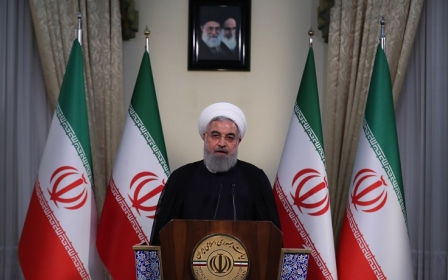Meet Amir Fakhravar, the 'snake oil salesman' pushing regime change in Iran

On 26 June, an event billed as the fifth “Iran Democratic Transition Conference” was held in a US congressional building on Capitol Hill in Washington, DC, hosted by an American outfit called the National Iranian Congress (NIC).
Defined on its website as a “political party in Washington, DC, United States of America”, the NIC pledges to support the “people of Iran” in their “battle to cut short the hands of celestial and terrestrial ideologies from the people’s lives, affording them proprietorship of their destiny”. In simpler terms: regime change all the way.
A May 2018 report on Iran by the US Congressional Research Service provides a brief history of the NIC: “[T]he Confederation of Iranian Students (CIS), led by US-based Amir Abbas Fakhravar, believes in regime replacement and in 2013 formed a ‘National Iran Congress’ to advocate that outcome. The group has drafted a constitution for a future republic of Iran.”
Who is Fakhravar?
Fakhravar is listed on the NIC’s “Leadership” page as “Chairman of the Senate”, in between “Attorney General of NIC” Arzhang Davoodi and “Secretary General of the Executive Cabinet” Ramin Nikoo. Surely it's only a matter of time before the organisation appoints a minister of agriculture and fisheries.
But who, exactly, is Amir Abbas Fakhravar?
A 2006 WikiLeaks cable from the US consul general in Dubai describes him as an “Iranian student activist and political prisoner on the run”, having ditched Iran “while on prison leave” and ended up in the United Arab Emirates “with the help of ‘friends’ who bribed [Iranian] airport officials not to enter his name into the computer”.
Batebi also questions how, if Fakhravar was as high-value a fugitive as he purported to be, he was able to fly out of Imam Khomeini airport with a passport in none other than his very own name
In Dubai, the cable specifies, Fakhravar had “met with Richard Perle” - one of the neocon gang that brought us the Iraq War and a staunch advocate for regime change in Iran - and “received a US visa to speak about Iran, at the invitation of the American Enterprise Institute”, an entity essentially dedicated to combating political and economic sovereignty across the globe on behalf of, well, American enterprise. And in the US he remained.
According to Fakhravar’s Twitter account - followed by just over 2,200 accounts at the time of writing - he is an “award-winning writer, constitutional law professor and president of Iranian Freedom Institute” (not to be confused with the NIC or CIS, of course).
His Twitter background image announces that his latest book is “available at Amazon”, although a quick visit to that venue reveals that “We don’t know when or if this item will be back in stock” - a shame, to be sure, given its tantalising title: Comrade Ayatollah: Soviet KGB’s Role In The Islamic Revolution and The Rise Of Khamenei To Power in Iran.
Bees to honey
A January 2018 article in the English-language edition of the London-based Arabic newspaper Asharq Al-Awsat reports that the book “includes hundreds of documents that reveal that Iran’s mullahs are not spiritual leaders, but in fact Soviet agents of the KGB intelligence agency [who] received training in Moscow in the 1960s and 70s”.
The paper quotes Fakhravar as asserting: “I obtained the documents from the KJB [sic] archive, as well as the CIA and Israeli Mossad and even the Iranian intelligence itself.”
In other words, Fakhravar is just the sort of marginal crackpot that attracts the Trump administration-Fox News consortium like bees to honey.
And he hasn’t failed to deliver. Appearing in early January on Sean Hannity’s Fox News show alongside warmonger John “Bomb Iran” Bolton - now US President Donald Trump’s national security adviser - Fakhravar swore that “the people in Iran … love President Trump”, and proceeded to volunteer these millions of Iranians to “be the army of the world to make [the] world free from the small group of fanatic mullahs who are in power in Iran”.
Fakhravar additionally thanked Bolton for being “right all the time when it comes to Iran” and being “on the right side of history”.
On my own visits to Iran in recent years, I’ve never encountered Iranians with anything less than pure contempt for Trump - whether they liked or hated the Iranian government - but perhaps these people didn’t know about the Soviet plot.
Hannity, who is extraordinarily close to the Trump White House and has been described as the president's “shadow chief of staff”, meanwhile took the opportunity to recap a convenient version of Fakhravar’s bio: “You were a student pushing for freedom and liberty, you were imprisoned in Iran for nearly six years, every bone in your body was broken, you were tortured.”
Rejected as a fraud
The tale scores high on the drama index, to be sure, but not everyone’s buying it.
Oxford-based historian of modern Iran Eskandar Sadeghi-Boroujerdi recently commented to me that, while “certain neoconservative hawks in Washington and far-right politicians seem willing to avail themselves of [Fakhravar’s] misinformation campaign in order to ballast their push for economic warfare and potentially a war for regime change against Tehran”, his mendacity is in fact “so widely accepted that he is even denounced as a fraud and wholly discredited by many Iranian opposition activists abroad”.
Case in point: vehement oppositionist Ahmad Batebi - known in the West as the face of the 1999 Iranian student protests who escaped from jail to the US - claims in a lengthy post on his website that, according to a lawyer, Fakhravar was imprisoned not for political activity but rather on account of vastly different allegations.
Citing reports that Fakhravar intermittently collaborated with prison security, Batebi also questions how, if Fakhravar was as high-value a fugitive as he purported to be, he was able to fly out of Imam Khomeini airport with a passport in none other than his very own name.
Whatever the truth may be, Fakhravar has carved out a rewarding niche for himself, particularly given his self-identification as an “ex-Muslim”, an authoritative position that permits him to confirm such right-wing theories as that the majority of Muslims in the US are effectively sleeper cells.
This particular point was covered in a 2016 interview with TV host Graham Ledger, in which Fakhravar blasted former US President Barack Obama for allowing too many Muslims into the US, despite having just explained that he himself came to the US as a Muslim.
Foreign policy potential
Though Fakhravar is certainly useful on the domestic front, foreign policy is where he really shines. His potential was already apparent in 2006, when the leaked cable noted: “While he makes clear he is not ‘pro war’ and will not publicly advocate a limited military strike against Iran, Fakhravar thinks such a strike on Iranian nuclear infrastructure would lead to a popular uprising” against the government.
“Publicly”, it seems, was the operative word.
'[Fakhravar is] amongst the most reprehensible of the dregs of a politically and morally bankrupt bunch who have hitched their wagon to the hope that the Trump administration will lead the US to a war against Iran'
Other gems contained in the cable include: “Iranians are not fighters, [Fakhravar] said, but are generally ‘lazy’ … [and] would welcome foreigners to ‘save us from ourselves.’” The consul general observed that Fakhravar’s “advocacy of full sanctions on Iran” was “rare” among Iranians, and that the man was merely concerned with “rally[ing] support for his cause” in the US: “He claimed no interest in political asylum, because in his words, he is a ‘freedom fighter’ and will return to Iran.”
Twelve years later, Fakhravar has yet to set foot back in Iran - although he has managed, surprise surprise, to visit Israel.
Sadeghi-Boroujerdi contends that Fakhravar has “shown himself to be a charlatan and snake oil salesman willing to say whatever and align himself with whoever is in power to further his abject career”, placing him “amongst the most reprehensible of the dregs of a politically and morally bankrupt bunch who have hitched their wagon to the hope that the Trump administration will lead the US to a war against Iran”.
Here’s hoping the wagon crashes before then.
- Belen Fernandez is the author of The Imperial Messenger: Thomas Friedman at Work, published by Verso. She is a contributing editor at Jacobin magazine.
The views expressed in this article belong to the author and do not necessarily reflect the editorial policy of Middle East Eye.
Photo: Amir Abbas Fakhravar meets with Israel's Tzipi Livni in Tel Aviv in 2012 (AFP)
New MEE newsletter: Jerusalem Dispatch
Sign up to get the latest insights and analysis on Israel-Palestine, alongside Turkey Unpacked and other MEE newsletters
Middle East Eye delivers independent and unrivalled coverage and analysis of the Middle East, North Africa and beyond. To learn more about republishing this content and the associated fees, please fill out this form. More about MEE can be found here.






